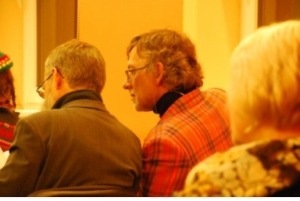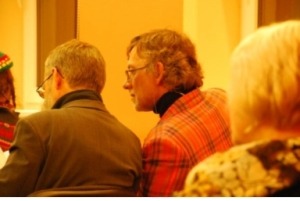LITERATURE AUTUMN: FROM TRADITIONAL “POETICAL AUTUMN OF DRUSKININKAI” TO ALTERATIVE “BETWEEN 0
AKLAS Žirklionis
www.kamane.lt, 2009 10 23
Readers of young poets in PAD 2009
Poets Vladas Braziūnas and Antanas A.Jonynas in PAD 2009
In brief: The members of the active alternative literature movement Žirklionis discuss their impressions experienced in the events “Poetical Autumn of Druskininkai 2009” and festival of audiovisual poetry “Between” seriously and with jokes. The young literature people, who searched for professionalism and sincerity in gatherings of poets, found even things they did not really want to find.
Mindaugas: Even though Žirklionis is a virtual phenomenon, we have not lost relation with nature. We live according to the cycle of nature. We were born with “Spring of Poetry”, enjoyed pleasures of “Nordic Summer” in summer and started the autumn with “Poetical Autumn of Druskininkai 2009” (PAD) and festival of audiovisual poetry “Between”.
This year PAD was dedicated to the laconic Japanese genre haiku. One could hear about two hundred haikus in two days in Druskininkai. We even participated in a seminar of haiku creation ourselves. We also participated in an evening of young poets’ readings and had a possibility to participate in the solemn ceremony of granting Jotvingis (“young” and “real”) prize. Perhaps it is autumn’s fault, but I felt severe contradictions after returning from the event. As I was in the role of a common reader-observer, I felt that I was not in the place I wanted to be throughout the event. The event did not have much in common with poetry. Even though the Japanese tried to render the subtleties of haiku genre, the readings reminded of amateur haikus about the first seen object. Various workshops of translations, presentations of poetry books of the year, formal ceremonies of awards, chaotic organisation of readings – all this reminded of a reporting meeting of some guild.
Eglė: True, one becomes frustrated when one has some preconceived vision about an event. I went to PAD with no early attitudes. True, the famous names of Kajokas, Marčėnas, Navakas, delegates from abroad in the programme let one suppose that hermetic mood of communication of poets with poets would not be avoided. The listeners and viewers of PAD were poets, translators and attendants from abroad themselves. The feeling was created that we appeared in the “kitchen of poets”. Thus, the question of non-actuality of a reader to a poet vanishes in this case. It seems that there were no readers in the event.
Lina: (…) I hardly received what I really anticipated and what was actually promised from the event: a deeper touch with poetry and poets as certain leaders, with the autumn-like but light melancholy that expands the inner depths. A thought comes to the head that the outing was kind of entertaining.
Loreta: True, there were not so many common readers. It was also unexpected to me that I appeared in a circle of arrogant crowd of poets over-estimating themselves, among which “poet-leaders” appear inevitably with their pen lifted high.
Eglė: I also disliked the organisational part of the event: I had hope that the projectors would be used not only for demonstration of supporters’ logos. They could assure the synthesis of view and sound or simplify the international communication. What could Japanese understand in the programme part conducted in Lithuanian? Could the participation of Lithuanians and representatives of other nations in the seminar on haiku creation be full-rate, when it was attempted to render the subtleties of this literature genre in hieroglyphs and poorly articulated English language? I missed improvisation, originality, manifestation of internal power, as it was the festival of autumn poetry rather than a fair of autumn harvest.
Dovilė: While you resented the arrogance of poets and chaotic organisation of the event, I repeated “Five-seven-five” – number of syllables in separate haiku lines. This was what we learned in Druskininkai, shouldn‘t we be glad about it? Still, I sometimes thought that all the responsibility for the event was put on the shoulders of Japanese – they were forced to prove the power of haiku to us throughout the event.
Speaking about the festival of audiovisual poetry “Between”, I could call it a certain opposition to the snobbery of "Poetical Autumn of Druskininkai”. One could feel here at once that there was no official mood: no halls with rows of chairs, only a shabby space needed by no one, except for young artists. The idea of the festival was really untraditional and could be worth attention, if the combination of views, sounds and movements persuaded the reader/viewer. Perhaps I am not an artist enough but I did not die of pleasure from views of forlorn places on the wall, rasp spreading from speakers and poetry screamed to the microphone in a madman’s voice.
The majority of presented works could be valued for technical skills but there was a lack of ideas worth attention. The film “Cow poetry" seen in the Poetical Autumn of Druskininkai already was shown here as well. The graceful dance in the cow farm mixed with texts written on the screen received great applause.
Mindaugas: To tell the truth, I did not understand “Cow poetry“ too. The combination of ballet in a farm, texts on cows and on screen and electronic music did not turn into an expressive symbiosis that would cause new aesthetical impressions.
Eglė: Perhaps the reverse principle functions here, and it was only attempted to turn attention to the incoherence of contemporary art using zoological and non-zoological means in the festival “Between”?
Dovilė: Actually, it is good that such festivals are organised, but they still lack professionalism.
Mindaugas: Thus, Žirklionis gathered various impressions in the autumn poetry events. Announcing the verdict, we have to admit that the Poetical Autumn of Druskininkai reminds of an event of a closed caste of creators that protects of grandeur of the Soviet-like writers’ status, while the festival of audiovisual poetry “Between“ was an experimental niche for young artists, in which ideas were exchanged and ways for improvement were searched.
Loreta: Anyway, I would go to the Poetical Autumn of Druskininkai and the festival “Between” next year again to discover something beautiful there, to widen the horizon, to enjoy towns I do not visit two often, get some new emotions, enthusiasm or simply to capture the miracle of poetry.
*) AKLAS Žirklionis are young literature people of Vilnius University, Kaunas Humanitarian Faculty. Participants of the discussion Mindaugas Grigaitis (leader of discussion), Dovilė Paškevičiūtė, Eglė Rudzkytė, Loreta Varaniūtė and Lina Staponaitė.


